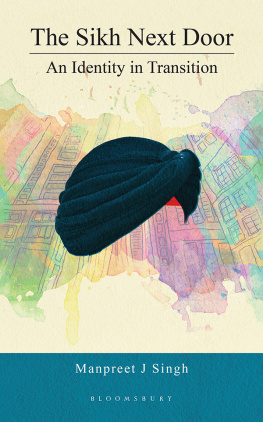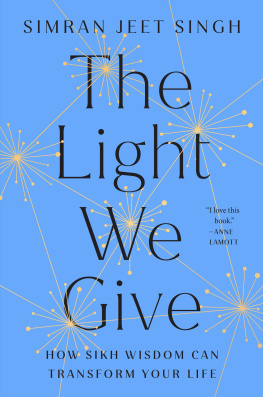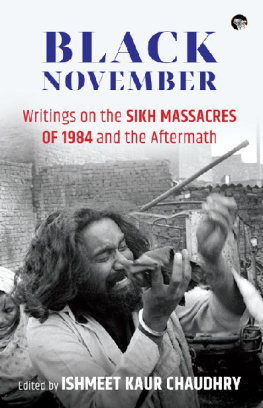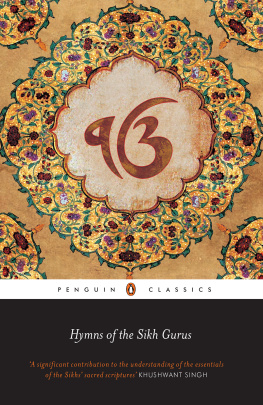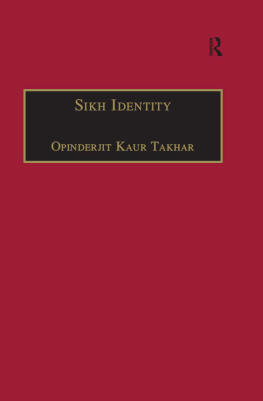Praise for Her Name Is Kaur
Its rare to find a book that makes you want to sit down and pray with an open heart, but Her Name Is Kaur does just that. Editor Meeta Kaur has gathered in this volume exquisite stories of how Sikh American women live their spiritual journeys, their loves, their losses, and their triumphs. This is both an important contribution to womens studies and a moving testimony to the power of religious community.
Daisy Hernndez, author of
Colonize This! Young Women of Color on Todays Feminism
Groundbreaking. I read Her Name Is Kaur in one sitting, heart quickening at each page, tears streaming at one point, as if quenching a centuries-long thirst. The courage coursing through each story is unmistakableand reveals what it means to be a Kaur: with love as her moral compass, she becomes the one she is waiting for.
Valarie Kaur, National Interfaith Leader and Founder of Groundswell
Written with honesty and courage. Her Name Is Kaur is a tapestry of love, friendship, commitment, and acceptance. Meeta Kaurs book is a selection of intriguing, eloquently crafted, and heartfelt personal narratives of Sikh women who share their stories of sacrifices, expectations, and challenges and deal with the complexity of relationships from dating, marriage, and finding true love to exploring ones sexuality to discovering what it means to be a KAUR. A beautiful journey of the human spirit, self-realization, and ultimately having faith.
Harpreet Kaur, filmmaker, Sach Productions
It has been an honor to read the stories of the women in Her Name Is Kaur. So sweet and humbling is this process of unshrouding ones self and finding a sort of liberation in a community of human imperfections, shared re-membering, gendered reclamation, and revealing vulnerabilities. The stories are filling a space in my heart that I did not yet know was open to be claimed, bringing deeper meaning to Sikh sisterhood. This collection is a game-changer.
Kirpa Kaur, Director, SAFAR and independent scholar
Her Name Is Kaur is a delightful collection of narratives of second-generation Sikh women living in America. These narratives provide us with a rare window into the lived experiences of different Sikh American who are constantly striving to maintain their Sikh identity in the face of new challenges. My heartiest congratulations go to Meeta Kaur, the editor of this remarkable book, for giving us much hope and inspiration.
Pashaura Singh, professor, Dr. Jasbir Singh Saini Endowed Chair
in Sikh and Punjabi Studies, University of California at Riverside
Her Name Is Kaur is a very important volume that uses the power of storytelling to amplify the voices of Kaurs, and to inspire the rest of us to gain strength from their narratives. Their stories teach us that falling in and out of lovewith place, with men, with children, with God, with women, and with themselvesis a struggle on the precipice of time and eternality. Highly enjoyable for the casual reader, this book is also an indispensable resource for university classes in womens studies, religion, and immigration studies.
Rahuldeep Singh, Assistant Professor of Religion, Director of
the Center for Equality and Justice, Cal Lutheran University
Her Name Is Kaur pushes past the boundaries of romance to illuminate the love at the very heart of faith. In this groundbreaking book, Meeta Kaur has gathered a diverse and fresh group of stories of growing up Sikh and redneck, Sikh and queer, Sikh and daydreaming, Sikh and heartbroken, Sikh and deeply beloved. Whether discussing the everyday (mother-in-law conflicts) or the taboo (mental illness), these women writers share colorful, intense, and engaging adventures that range from Los Altos to Toronto to Chandigarh. This collection deserves a place on the shelf of everyone interested in South Asian cultures, women of America, and just good storytelling.
Minal Hajratwala, author of Leaving India:
My Familys Journey from Five Villages to Five Continents
Her Name
Is Kaur

Copyright 2014 by Meeta Kaur
All rights reserved. No part of this publication may be reproduced, distributed, or transmitted in any form or by any means, including photocopying, recording, digital scanning, or other electronic or mechanical methods, without the prior written permission of the publisher, except in the case of brief quotations embodied in critical reviews and certain other noncommercial uses permitted by copyright law. For permission requests, please address She Writes Press.
Published 2014
Printed in the United States of America
ISBN: 978-1-938314-70-4
e-ISBN: 978-1-938314-71-1
Library of Congress Control Number: 2014938616
For information, address:
She Writes Press
1563 Solano Ave #546
Berkeley, CA 94707
This book is dedicated to my mother, father, and brother, who taught me to never give up on love, that the struggle for love is worth everything, and to value the priceless nature of Wahegurus love through compassion, courage, and commitment.
This book is also dedicated to Banjot, Benanti, and Sidak, who show me what love is every day.
And finally to all of the Kaurs and Singhs worldwide. May our presence bring love, peace, and compassion to the world.
rang tamasa pooran aasaan kabhi na bi-aapai chintaa.
May love be yours and your hopes fulfilled. May you never be
worn by worry.
Guru Arjan Dev Ji, the fifth Sikh Guru
CONTENTS
by Nikky-Guninder Kaur Singh
by Preeti Kaur
by Sonam Bhimbra
by Anu Kaur
by Gurleen Kaur
by A. Kaur
by Sargun Kaur
by Puneet Kaur Sahota
by Surinder Singh
by Sangeeta K. Luthra
by Mandeep Kaur and Neesha Kaur
by Harsohena Kaur
by Jalmeen Kaur
by Jessi Kaur
by Subrina Singh
by Jasminder Kaur
by Gurpreet Kaur
by SatJot Kaur
by Manbeena Kaur
by Prabhjot K. Ahluwalia
by Manpreet Kaur Singh
by Meeta Kaur
by Simran Kaur
by Gunisha Kaur
by Harbani Ahuja
by Harleen Kaur
by Sheba Remy Kharbanda
Introduction

G rowing up, I watched my mother, nani, and maasis gather around our kitchen table like five-star generals preparing for battle. Dressed in eyelet salwaar kameezes with their brown-black hair pinned up in buns, they organized family celebrations, kirtans, and critical family meetings to determine the future of each child. Each woman exuded self-confidence in her own abilities, seldom questioning her decisions. And when one did, she asked the others and they generously shared their wisdom, forming a strong alliance. They often concluded that the extra baturas (fried bread) made for a kirtan, the additional money saved and then spent on graduate school for each child, or the extra Sukhmani Sahib prayer conducted for my Mamaji (maternal uncle) dying of cancer was all worth it. A little more theyd say, despite the aching backs and throbbing knees. We are almost done, was always the way with these women. They filled the kitchen, family room, and bedrooms with loud and passionate planning debates in Punjabi while punctuating the smallest of details in Catholic School English. Our home, like so many others in the Sikh American community, became a busy command central for the important events that bound us together and united us as a family and community. I remember my father, uncles, and brothers standing ready and willing to execute whatever the vision was. I also honor the moments in my home and so many other homes when my mother, nani, and maasis stood steadfast to be understood and treated as respected equals, their God-given right as Sikh women.




